Herbal class review of the Herbal Academy‘s “Intermediate Herbal Class” to help you decide which herb school is right for you and also which class delivery form will help you learn the best.
The Herbal Academy – “Intermediate Herbal Class” – A review
As you are looking over the course offerings of the different online herbal schools, you might be a little confused. It’s not quite like comparing apples with apples.
This series looks some popular online Herbal Schools and compares their introductory and intermediate courses. As you compare the different schools and the classes they offer, you’ll have confidence knowing which of the course offerings best fit your own goals as a budding herbalist or a blossoming herbal entrepreneur.
I’ve taken classes at each of these online schools, so I’ve given you my personal opinion of where I see the strengths and weaknesses of each program. I hope you find this series helpful and that it gives you confidence to choose the herbal study program that is right for you.
My goal is to give you self-assurance in growing and using herbs so that you can choose your own path, whether formal education, online classes, an herbal membership, like this one, in-person workshops, books, or self-study. The study of our plant allies and the miracle of healing, is a study that can hold you for a lifetime.
In this post I review the Intermediate Herbal Class from The Herbal Academy, formerly the Herbal Academy of New England (HANES).
What is the name of the course?
“The Introductory Herbal Class” and “The Intermediate Herbal Class” together make up the Family Herbalist package. With these two courses and a third class, “The Entrepreneur Herbalist Course”, The Herbal Academy offers the Entrepreneur Hebalist package. These three courses together would be a similar level of herbal knowledge to the Chestnut School of Herbs Herbal Immersion Course.
Each school has a different emphasis though. They are not equivalent across the board. I offer this comparison so that you understand the limitations and scope of the different online courses offered.
This review covers the Herbal Academy’s Intermediate Herbal Course, the course I took in 2014-2015.
How long is the course?
The course is 10 units long. The Herbal Academy recommends doing one unit a month so it should take approximately one year to complete the course on a part time basis. Students have access to the course materials for two years from the date in which the course is activated in their student portal on The Herbal Academy website. (Update August 2023: The Herbal Academy now offers lifetime access to new enrollments in their Intermediate herbal course).
Who is teaching the course?
The course is taught by a variety of instructors that have expertise and experience in the area that they are teaching. There is not one dominant instructor throughout the course. Students benefit from the expertise of herbalists and medical doctors with diverse professional backgrounds. This is one of the strengths of all the Herbal Academy classes.
How is the course presented?
The Intermediate Herbal course is presented with mostly written instruction, punctuated by occasional video, and a great many recipes for herbal medicine, topical medicines, cosmetics, and culinary condiments. Every body system is explained with a detailed anatomy and physiology video taught by a medical doctor.
The units focus on one body system each. Around this framework the common problems that might be encountered in that particular body system are presented with possible herbal solutions. When an herb is introduced there is often a partial plant monograph of that herb so that students can begin to collect their own personal Materia Medica. Students will expand their notes on each herb, as they learn more.
Students are encouraged to use other sources of information beyond the class notes so that they can expand on their herbal knowledge. Life-long learning is emphasized throughout.
Ayurvedic, Chinese Traditional Medicine, and Western herbalist tradition are introduced in the course and synthesized with knowledge from scientific peer reviewed studies. This synthesis of diverse information from several schools of thought gives students a broad knowledge base to pursue personal study after the course is completed. This is one of the course strengths.
One thing I enjoyed throughout the course was the introduction of “flip books”. Flip books are printable pdf files full of fun recipes to try, as the student becomes more familiar with the body systems and individual herbs.
If you’ve only dabbled in herbal medicine before taking the class, you’ll find you need to build an apothecary cupboard to hold all the fun medicines, finishing salts, lip balms, topical creams and lotions you create during the course. If you enjoy making your own gifts for birthdays and Christmas this course will fill your gift cupboard with amazing and unique gifts to give.
Who is this course for:
You don’t need to take the Introductory Herbal Course before taking the Intermediate Herbalist course if you have experience making herbal tinctures, vinegars, honeys, and cosmetics. And know how to do herbal research to understand herbal actions and herbal energetics. But if you are just beginning your study of herbs, you may be more comfortable in the beginner herbalist course before diving in to the intermediate course.
By the 3rd lesson in the Intermediate course you are deep into human anatomy and physiology. Someone who is just becoming familiar with how herbs work, may become overwhelmed in the advanced science lessons. On the other hand, those with a scientific background, who have courses in human anatomy and physiology, will be able to pick up the herbal knowledge they need from this course, without studying the beginner course first.
What learning style is this course predominantly catering to?
This course is well suited to visual learners. Each unit can be printed as a pdf file. Only the videos are not transcribed for printing.
Auditory learners will be able to read the course material aloud to master the material. While there are videos in each unit, the majority of the course is presented in print format with photographs. Very little of the actual course content is presented in audio format. Auditory learners will be the most disadvantaged by the way the course material is presented.
The lessons are short with lots of hands-on activity so kinesthetic learners will not be overwhelmed.
What does this course do well?
I love that there are several instructors presenting their own areas of expertise in the course. When you have a question, the instructor with the expertise in that area is called on to answer the question. You do receive a personal answer to your question. Not just a generic answer.
The course is colourful, well put together, and well thought out. The course is complete on its own, but also an integral part of each of the advance study programs offered by The Herbal Academy.
The Intermediate Herbal course is put together with the thought of where the student will go next in their studies, once this course is completed. This course lays the foundation for the next level of herbal education, whether the student desires to work toward a certificate along the entrepreneur herbalist path, the professional herbalist path, or the clinical herbalist path.
For students who simply want to gain a strong foundation in herbalism for making herbal remedies for their own family members, the Intermediate herbalist course fulfills the need.
The synthesis of traditional Western Herbalism, Ayurvedic, and Traditional Chinese Medicine with the scientific, evidence-based use of herbs is a major strength of this class.
How is this course different from other similar courses:
I personally felt that this class experience was warmer. There is a forum and a Facebook Group where students can ask questions and offer comments as they go through the course work. Questions are answered cordially and encouragingly, by the instructors, in the private forum and the Facebook Group.
I felt that the instructors were more approachable than my experience with some of the other online courses I’ve taken.
The scholarship and practical experience in the instruction is emphasized. The intermediate course gives the student a broad introduction to different schools of thought in herbal medicine. Some of these schools of thought are contradictory. The contradictions are discussed rather than ignored.
Concerns about endangered plant species were covered and students were encouraged to join United Plant Savers to help in the conservations of endangered wild medicinal herbs.
Using herbs during pregnancy, child birth, and nursing was covered as well as herb safety with infants and children. Scientific studies on herb safety and efficacy helped to solidify the knowledge of herb safety. For an introduction to herbal use for women’s health and men’s health see this free lesson from the Introductory Herbal Course, and see if this style of learning is right for you.
Where are the gaps in what this class covers?
The course was short on growing and harvesting fresh herbs or wildcrafting, a topic that The Chestnut School of Herbal Medicine covers extremely well.. I did have questions about plant identification during the course that were not answered in the course material or in the forums. These gaps can be met through other online courses or self-study.
The course encourages making herbal medicine from dried herbs rather than fresh. Apartment dwellers would be just as comfortable studying the course materials as the seasoned homesteader with vast amounts of garden space.
This class is a level class that fits into all of The Herbal Academy’s advanced herbalist paths. Some of the gaps in the knowledge base of this course will be covered in The Herbal Academy’s more advanced classes.
For a greater emphasis on growing herbs and using herbs in permaculture see The Chestnut School of Herbal Medicine Herbal Immersion Program. or The Homegrown Herbalist School of Botanical Medicine.
What challenges will someone face in completing the course?
The course work is 10 units long and the student has a full 2 years to complete the material, before they lose access to the course. However, the two year count down doesn’t begin until the course is activated on the School’s website. Many students purchase the course when it goes on sale, and hold it in their student account until they are ready to begin. This is a great strategy if you know that you are going to take several courses. The Herbal Academy has several sales each year.
What about the tests? Would someone with test anxiety have difficulty completing the course requirements?
The tests for the Intermediate Course are multiple choice and short. Usually around 25 questions long. Students must have 80% in the test in order to go on to the next unit. However, the test can be retaken as often as you need to so that you are assured a pass.
A sample test is included in the pdf document for each unit. I found it helpful to use the test as a study guide as I was reading each lesson. I would write down my answers to the test questions before I studied the unit, in pencil. Then as I was studying each unit I would note where my initial answer was wrong, and focus on learning that area in more detail. I may consult my herbal library books or scientific studies to gain a deeper understanding of the material.
Should you enroll in the Herbal Academies Intermediate Herbal Class?
Only you can decide, based on your own learning style, and your motivation which online herbal program is right for you. To help guide your decision try out this actual lesson from the Herbal Academy‘s Introductory Herbal Course.
IMO, this class best suits a visual learner with a desire for a well-rounded, bookish education in herbs, who likes to do kitchen chemistry. It is an excellent beginning to a career in herbs or herbal medicine.
It’s also an amazing opportunity for personal enrichment at a very reasonable price. The average distance learning university course is about $1500 for 3 credit hours today. While this course is not accredited, students who complete the advanced herbalist program and 400 hours of clinical apprenticeship are qualified to apply for professional membership in the American Herbalist Guild. Your regional herbalist guild membership requirements may vary.
Not Yet Ready for the Intermediate Class?
The Herbal Academy’s Introductory Herbal Class is for those who are new to herbs and all they have to offer. Try this sample lesson on Women’s Health and Men’s Health and learn about our herbal allies Nettles, Red Clover, Chaste Berry, Red Raspberry, Yarrow, Shepherd’s Purse, Black Hawthorn, Chamomile, and Saw Palmetto, to name just a few of the herbs in this lesson.
Or Join the Herbarium and gain access to the amazing resources that are updated monthly, for individualized self study of herbs. With the Herbarium you will guide your own study. I highly recommend joining the Herbarium membership even if you choose to study at another school. The information there is very beneficial while you research your herbal allies. It includes a searchable data base and several downloadable ebooks and ezines to help you focus on one herb at a time, in your studies. You can join the Herbarium here.
Herbology
Considerations in evaluating an online school of Herbalism
A Review of the Chestnut School of Herbs, Herbal Medicine Making Course and Herbal Immersion Program
A Review of The Herbal Academy, Intermediate Herbal Course (this post)
A Review of the Vintage Remedies Family Herbalist Course
A Review of the Herbarium membership site
For those brand new to herbs my membership, The DIY Herbal Fellowship, is a great place to get your toes wet, and to see if learning herbs is a good fit for you. The DIY Herbal Fellowship gives you immediate access to over 100 herbal classes for one low monthly fee. Classes include wildcrafting, foraging, cooking with herbs, making herbal remedies, stress management and so much more.
Learn more about the DIY Herbal Fellowship here.
Disclaimer: I received complimentary tuition in the Intermediate Herbal course in 2014. This was in return for blogging about my experience in the course in 2014. Joybilee Farm has an affiliate relationship with The Herbal Academy. I was not required by the Herbal Academy to write this review, nor was I required to give a favourable opinion of the class. This review represents my honest opinion of the course. This post contains affiliate links.


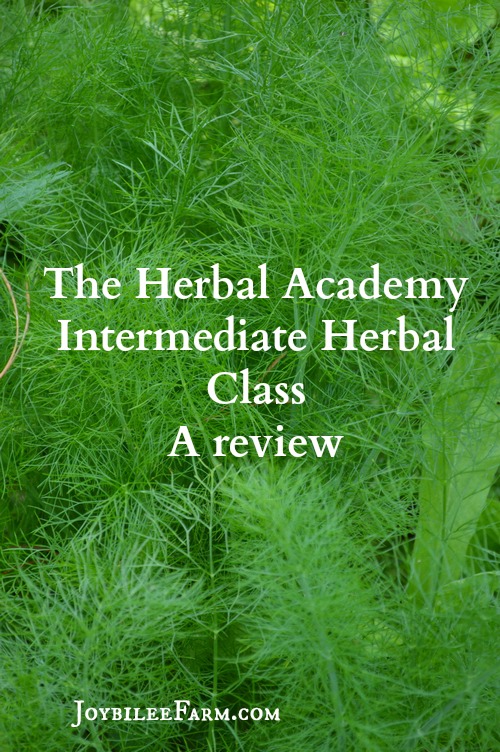
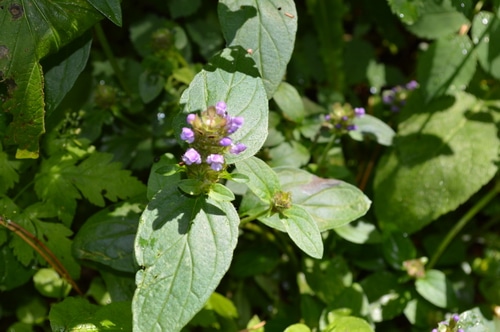
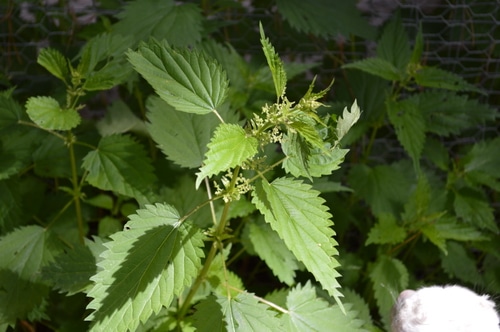

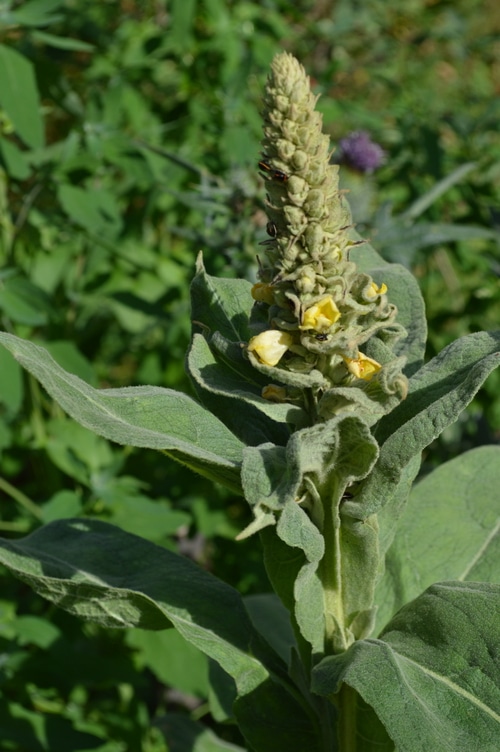
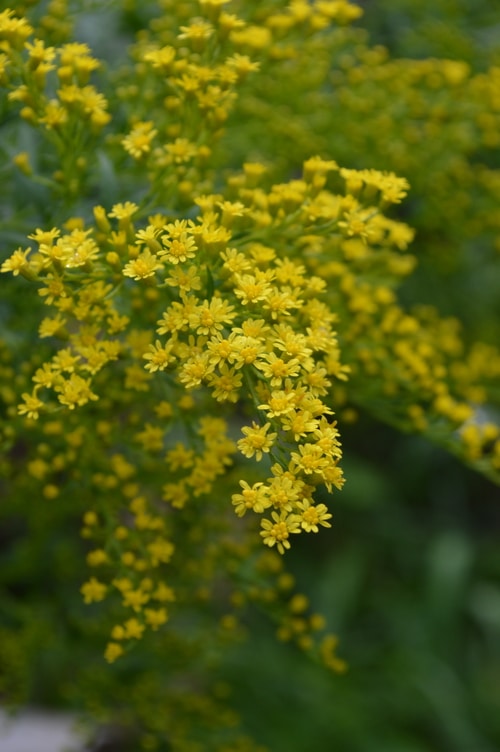
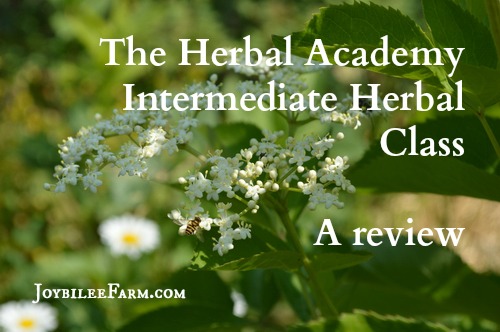
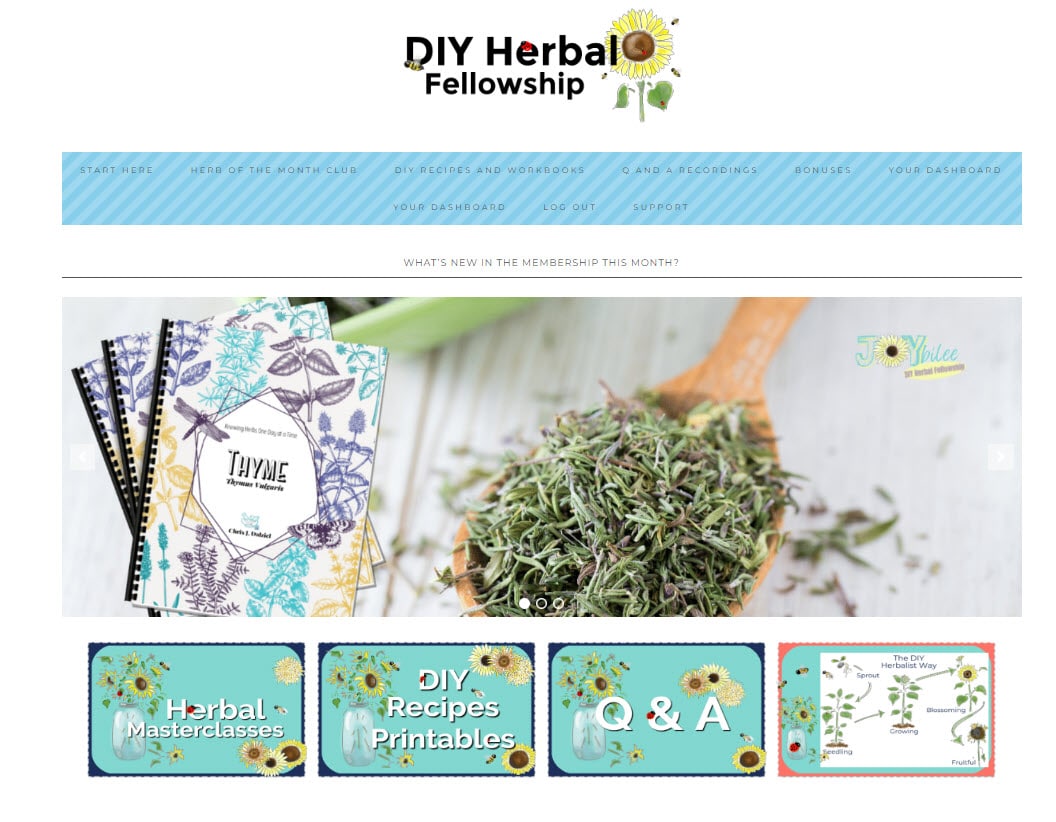

Katie, I’m glad it was helpful to you.
This was incredibly helpful! Thank you for creating this, I was going back and forth trying to choose between two different schools/courses, and having an outside opinion from someone who took many courses was exactly what i needed.
thanks again!
If you have herbal experience but no formal herbal education, I’d recommend starting with the Intermediate course at least rather than diving right into the entrepreneur course. The Entrepreneur course assumes knowledge of herbs and physiology. If you have very little herbal education, then you would benefit from beginning at the beginning with the introductory course. It’s a fun course and will help you develop good study habits to carry you through all three courses. Let me know what you decide to do.